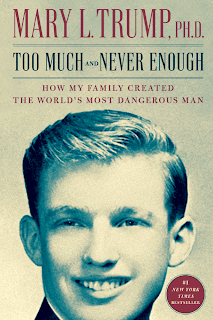Tolstoy, the great Russian writer, says at the
beginning of his book “Anna Karenina”:
“Happy families are all alike; every unhappy
family is unhappy in its own way”.
I wonder what Tolstoy would have made of Donald
Trump’s family, as depicted by Mary L. Trump, Donald’s estranged niece, in her
book “Too Much and Never Enough”. The book was published on July 14 to become an
instant best seller in the USA and received with great interest here - not least by me. I am very grateful to my friends in the US for
sending me this important book.
Mary Trump is a clinical psychologist, and
spends most of the book detailing the family background which created the
psychological phenomenon that is her uncle, although she admits that she does
not have the definitive analysis of her uncle’s personality. That, she says,
would require a full battery of tests that he would refuse to take.
Soap fans – especially those who remember
“Dallas” – will be fascinated by the fallouts and arguments within this wealthy, but "malignantly dysfunctional" (Mary's term) family that are covered extensively in Mary Trump's book. The central figure in the story is not Donald, but his father, Fred, described by Mary as "a high-functioning sociopath". This paterfamilias made a fortune from property development in New York City
for projects that were not always built. Donald’s mother came from The Isle of
Lewis in Scotland. Not long after landing in America, she met and married Fred.
Both, as the old English saying goes, “knew the value of money” – a euphemism
for frugality.
They had five children, Donald being the second
son, the first being Fred junior, Mary Trump’s father. Fred junior, put simply,
was a “disappointment” to his father, failing as a businessman and incurring
Fred senior’s displeasure by trying to launch an abortive career as an airline
pilot. Fred junior returned to the family fold, only to descend into
alcoholism, dying in 1981. When Fred senior died, in 1999, it appeared that he
had cut his oldest son’s children out of his will, which led to a law suit.
Donald, on the other hand, remained in his
father’s good books, because, as Mary says: “..although his middle son didn’t
have the temperament for the day to day attention to detail…he had something
more valuable: bold ideas and the chutzpah to realise them”.
He also developed traits that would serve him
well later in life. In his teens, he paid someone else to take the test that he, Donald, needed
for admission to the University of Pennsylvania. Also, according to Mary, her
uncle tried to get his father, Fred senior, to make him his designated heir.
Besides this, she gives numerous examples of how Fred senior funnelled funds to
Donald, giving “The Don” an undeserved reputation as an adept businessman.
All this will be of interest to many, but only
in the final chapter does Mary Trump examine Donald as a strictly political
creature. And she does a very good job. In
a nutshell, she states: “His real skills (self-aggrandizement, lying and
sleight of hand) were interpreted as strengths unique to his brand of success…his
cruelty serves…as a means to distract both us and himself from the true extent
of his failures”.
Well, as we know, his failures have led to his
being impeached for the second time as a president. So far, says Mary Trump in
the last sentence of her final chapter: “…he’s gotten away with everything”.
With his failure to effectively handle the Covid-19 pandemic, and his whipping
up of the mob that ransacked the US Capitol building, the Trump wagon might be
coming off the rails. Whether this happens or not, it’s clear from the book and
his tenure as president, that he will remain blithely innocent in his own eyes.
I recommend this book for anyone seeking to understand the environment that
created Donald Trump.
Lastly, a note of caution for us in the UK:
Trump has said that he would leave the US if he lost the election. What’s not
generally realised is that he is perfectly entitled to come and settle in
Britain – probably Scotland. He has many friends in high places here, and it
would not take him long to acquire citizenship. He still has a great deal of
money, and the Conservative Party would most likely be grateful for any
contributions he made – and welcome him as a member. We could even see Donald Trump standing for election to the UK Parliament – and what a sensation that would make! This
will undoubtedly be scoffed at by many readers, but it is not beyond the
grounds of possibility, and no more unbelievable than some of the things Trump has
done already - including becoming President of the United States.
Trump fans celebrate the end of his presidency.
A Trump admirer honours his hero's achievements.







No comments:
Post a Comment